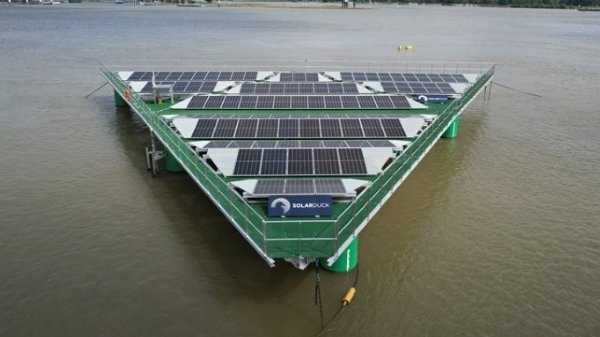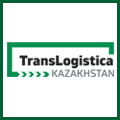 One of the pilot project solar units (SolarDuck)
One of the pilot project solar units (SolarDuck)
Published Aug 24, 2021 7:29 PM by The Maritime Executive
For the first time, a floating offshore solar technology has received an Approval in Principle (AiP) from one of the leading classification societies. According to Bureau Veritas which issued the approval to Dutch renewable energy company SolarDuck, this marks the beginning of a new era for this form of renewable energy.
Launched in April, SolarDuck’s first pilot known as King Eider consists of four triangular-shaped units, which are mounted by 156 solar panels and deliver a combined electrical output of 64 kWp to the grid. The structure holds the solar panels approximately 10 feet above water level. The platform is designed to handle coastal sea conditions and hurricane-force winds. It is also optimized for offshore sites in estuaries, natural harbors, as well as near-shore sites.
Bureau Veritas was involved in the project from the design stage. The AiP covers the design methodology of the unit’s structure and validates the relevant parts using standards for marine renewable energy technologies and offshore wind turbines.
“Building on our experience in the marine and offshore market, we supported SolarDuck throughout this innovative journey by assessing risk, analyzing regulations, and improving the overall structure performance and mooring safety,” said Paul Shrieve, Vice President Offshore & Services at Bureau Veritas Marine & Offshore. “We are proud to be part of the venture and to contribute to make this cutting-edge solution reliable.”
Each unit measures nearly 53 feet on each side of the triangle. The pilot units were built by Damen and deployed this spring.
Over the past months, we have been constructing this floating offshore platform of 16 x 16 x 16 metres that we have developed together with SolarDuck. The goal is to generate sustainable electricity for cities and large companies in the Global Sun Belt. #Damen #Sustainability pic.twitter.com/oBdrSu3NMp
The project, which was deployed in IJzendoorn, in the Netherlands, was born from the ambitions of a group of maritime and energy engineers, who founded SolarDuck to play an active role in getting the world to net zero. Upon realizing that solar energy is an inexpensive and efficient form of renewable energy for many cities, islands, and regions around the globe, but inaccessible to many of these regions due to land scarcity constraints, the team initiated the project to make solar panels float offshore.
According to the team at SolarDuck, water-based solar applications will yield higher energy outputs with lower costs and efforts required for installation. They expect to combine the broad availability of the coastline versus onshore locations with benefits ranging from shorter transmission lines and fewer maintenance requirements which results in less space required per MW installed.
Source www.maritime-executive.com




.jpg)






